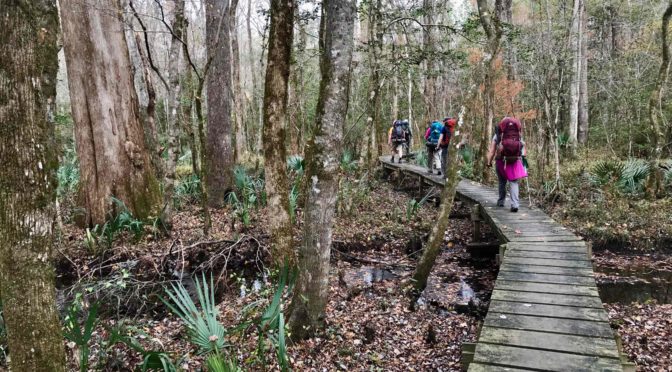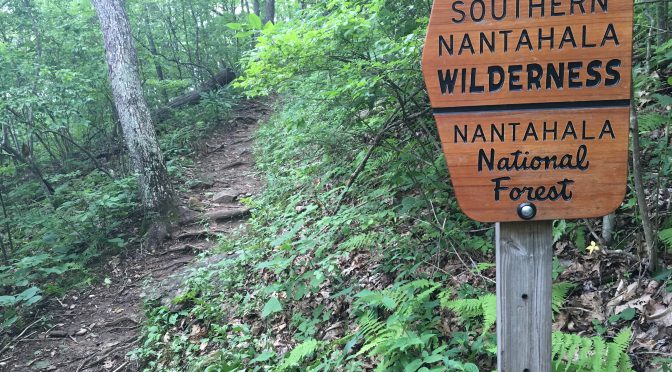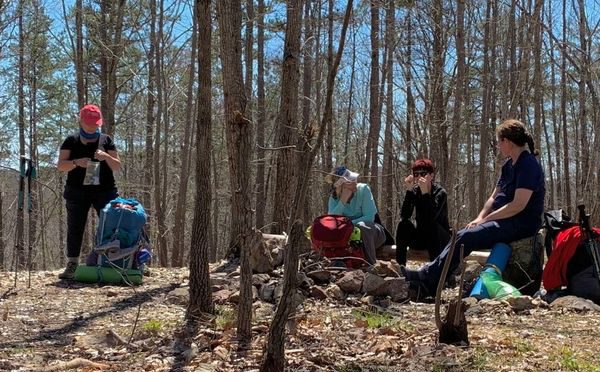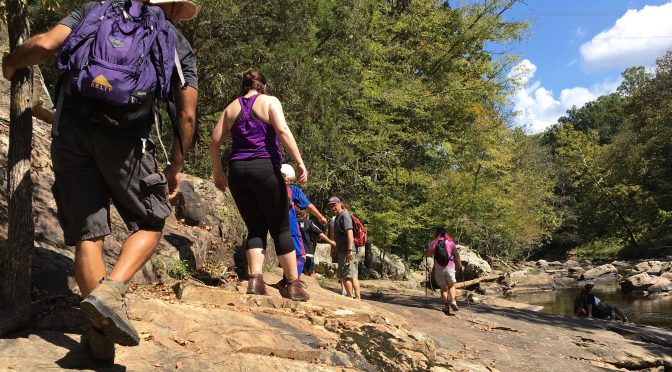We love hiking in winter. Its allure — cool temperatures to keep you moving, dry air, and awesome light, to name three — go largely unappreciated. Still, it’s a time for shorter hikes. Shorter hours of daylight, the rapidly disappearing late-day sun, the cold early and late. It’s a great time to be out, just not for prolonged periods of time.
Tag Archives: training
5 mountain hikes with altitude, attitude
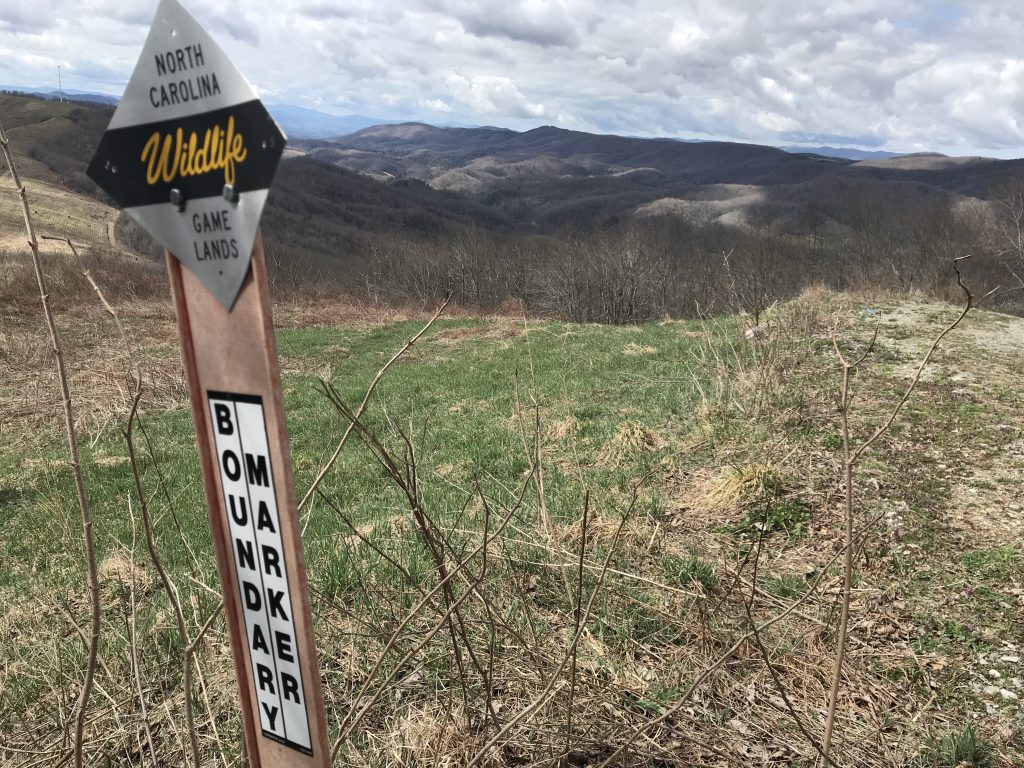
On Saturday’s final hike of our 2018-2019 Winter Wild hike series, we decided to add an extra mile or so. It was a mile of trail I hadn’t hiked.
This past weekend I hiked 4.8 miles on three trails with a combined elevation gain of nearly 4,000 vertical feet. That’s an average grade of about 14 percent.
take it slow going into the 2019 hiking season
Carol discovered the virtue of two trekking poles vs. one.
Cat was reassured that she’s still perfectly happy eating cold ravioli out of a can.
Kathy discovered she is overweight —morbidly so.
All in all, a pretty successful weekend of backpacking for the first trip of the season.
Get those legs in shape for summer hiking
There’s a lot you can do starting right now to get in hiking shape.
Every day
First, on a daily basis walk, walk, walk. If you use a step-counter and your goal has been 10,000, up it to 15,000. Make yourself cognizant of the need to walk as much as possible. And take the stairs whenever the opportunity arises. If it helps, as you trek up the stairs in that dank, gray stairwell visualize one of the most scenic climbs you know.
Training hikes near home
On the trail, train on the hilliest trails you can find close to home. Here are some of our top choices for hilly hikes:
- Charlotte. Crowders Mountain State Park: From the Visitor Center, the climbs to both Crowders Mountain (Crowders and Rocktop trails) and The Pinnacle (Pinnacle Trail) have some steep sections; the 1.8-mile Tower Trail from the Linwood Access probably offers the best bang per vertical foot. At Morrow Mountain State Park, Sugar Loaf Mountain (2.8 miles) and Hattaway Mountain (2 miles) trails will build up your quads.
- Triad. Pilot Mountain: Start from the Pinnacle Hotel Road access and hike the Mountain Trail from the base of the mountain up to the Grindstone Trail, up to the top, gaining more than a thousand vertical feet in 4.5 miles. At Hanging Rock, start from the Flinchum Road Access on the Dan River and hike up the 3.6-mile Indian Creek Trail to the Visitor Center, then catch the 4.7-mile Moore’s Wall Loop Trail to the top of the park, a total elevation gain of about 1,700 feet. GetHiking! groups will be taking trips to Pilot Mountain and Hanging Rock this weekend and next; see below for details on how to join us.
- Triangle. You can find some steep but short climbs in Eno River State Park (try Cox Mountain and Holden Mill Trail hiked clockwise), but your best bet for prolonged climbs is to drive to the Uwharrie National Forest and hike the 6.3-mile stretch from the Jumpinoff Rock Trailhead to Pisgah Covered Bridge Road, over Little Long Mountain and Kings Mountain.
- Greenville. Raven Rock State Park is a two-hour drive: there, you could get in a few laps on the 135-stair staircase leading down from 150-foot-high bluff to the Cape Fear River, and the 5-mile Campbell Creek Trail has some elevation.
- Charlottesville, Va. Having the Shenandoah National Park in your backyard is like having the best natural stairclimber around: so many good options. Leading Ridge Trail in the Central District offers the best elevation change: about 1,650 feet in one mile.
- Virginia Beach, Va. The bad news for mountain training when you live at the beach is that you live at the beach. But when it comes to natural stairmasters, you’re hard-pressed to top Mount Trashmore. Spend 30 minutes on the trash heap three or four times a week and you’ll be ready for most any climb.
Resources
This fall, GetBackpacking!
Let’s talk for a minute about backpacking.
You mean strapping a bulky, steel-frame pack with 60 pounds of gear to your back and hiking 20 miles?
No, I’m talking about slipping on a custom-fit, internal-frame pack with about 30 pounds and hiking 10, maybe 12 miles tops.
And eating pork and beans out of a can, and drinking water treated with iodine that tastes so bad you have to mask it with Kool-Aid?
Actually, I’m talking about feasting on entrees such as lasagna and chicken with wild rice, and washing it down with sweet mountain stream water treated with a modern filtration system.
And sleeping — or not sleeping — on hard ground in a cloth bag that will leave you shivering if the temperature drops below 40?
I’m talking about a bed consisting of a plush inflatable pad and a cozy down sleeping bag that will make you forget all about that sleep number back home.
Are you sure you’re talking about backpacking?
Yes indeed, though I’m not talking about your father’s backpacking, when canvas tents became sieves at the slightest touch when it rained, when external frame packs made their mark, literally, on your back, and when we hiked in jeans, which were great — until they got a little wet.
I’m talking backpacking, 2015 style.
Backpacking, 2015 style
Ever since I wrote “Backpacking North Carolina” in 2011, I’ve been on a mission to dispel the myths of backpacking. Take that 60-pound pack. Sure, back when you did subsist on canned goods and you cooked out of a cast-iron skillet, you could wrack up the weight pretty quickly. But today, in 2015, nearly every foodstuff either comes dehydrated or can be dehydrated (check out this ice cream sandwich). And titanium may be pricey, but it can also provide a cookset weighing less than a pound.
Or sleeping. Manufacturers have employed open-cell technology to create inflatable sleeping pads that offer a plush lift rivaling your mattress at home. Plus, they weigh ounces and can be broken down to take up minimal room in your pack. And if you thought climbing into bed at home on a cold winter’s night was something special, wait until you’ve snuggled into a modern sleeping bag for the evening.
And about those 20-mile days. If we were Marines on a mission, 20 miles in a day would make sense. But the goal of recreational backpacking isn’t to save the free world, it’s to be free of it. And that means adhering to your own schedule, one you can make as leisurely as you like.
Intrigued by what you’re hearing of this friendly new way of backpacking?
Then you’ll be intrigued by our GetBackpacking! program.
GetBackpacking! Backpacking 101
GetBackpacking! is a four-week program intended to turn the backpacker-wanna-be into a bonafide backpacker. We start with three weekly training hikes:
Week 1: How to pack a pack. We’ll learn to properly pack a backpack, working on weight distribution and focusing on what we really need — and don’t. Then we’ll take a 2-mile hike to get a feel for hiking with a full pack.
Week 2: We’ll hike in two miles, then set up camp, focusing on finding a proper tent site and how to establish our temporary home. Then we’ll pack up and hike out.
Week 3: After hiking for about 2.5 miles, we’ll stop and make a meal. We’ll look at the various food and cooking options available and discuss the pros and cons. Then we’ll pack up, practicing Leave No Trace ethics, and hike out.
Week 4: Graduation trip planning session. On Wednesday evening, we’ll meet for a trip planning meeting. Our destination is determined — South Mountains State Park — but we will plan the rest of our trip from there.
Week 4: Graduation trip to South Mountains State Park, leaving Friday afternoon and returning Sunday. Two nights on the trail. The hike in is short, a little over a mile. On Day 2, we’ll hike 5.5 miles and on Day 3, about 7 miles.
About the gear: If you don’t have everything, don’t worry. Great Outdoor Provision will make available a limited number of rent-to-own tents, backpacks and sleeping bags. Not having a cookset isn’t a deal-breaker, either. The main gear you’ll need are a good pair of boots and trail-friendly clothes — basically, what you wear to hike.
On Monday, August 17, we will have an introductory session at the Great Outdoor Provision Co. in Raleigh’s Cameron Village. We’ll tell you about the program in more detail, we’ll show slides of some of the great places you can backpack in the region, including the trip we will be doing. We’ll have handouts, including a list of 10 of the region’s top backpacking destinations. We may even sweeten the pot with a giveaway or two. It’s the perfect opportunity to learn more about backpacking and see if this program is right for you.
To make sure each participant gets the specialized attention he or she needs, the four-week sessions are limited to 12 participants each. We’ll conduct three sessions this fall: in September, October and November. The fee for the program is $75, $35 of which can be recouped in the form of a Great Outdoor Provision Co. gift card.
We look forward to sharing our love of backpacking. See you on August 17.
* * *
What: GetBackpacking! information program
When: Monday, August 17, 6:30 p.m.
Where: Great Outdoor Provision Co., Cameron Village, Raleigh
The skinny: We’ll tell you all about our new GetBackpacking! program, designed to turn the novice into a confident backpacker. We’ll go over our four-week program, talk about our weekend graduation trip, discuss gear and have a slide presentation of some of the great places to backpack in the region.
To register for the info session, go here.
Read a post about the program in action and what GetBackpacking! graduates have to say, here.
